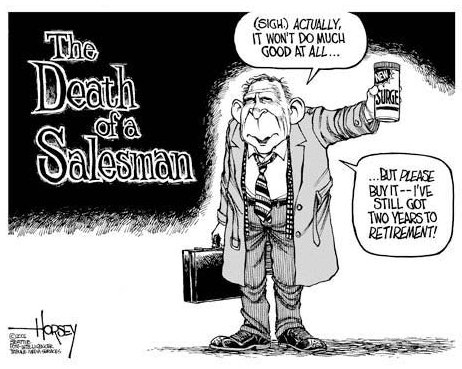Search
Recent comments
- monstrous...
9 min 17 sec ago - chomsky's advice....
2 hours 39 min ago - destroying america....
5 hours 38 min ago - critic....
6 hours 41 min ago - talking....
7 hours 24 min ago - one nation's fairies....
8 hours 52 min ago - assassination....
9 hours 3 min ago - "error"...
10 hours 21 min ago - playground....
10 hours 23 min ago - mossad.....
1 day 53 min ago
Democracy Links
Member's Off-site Blogs
the great scamster .....

Bush's neo-conservative doctrine seeks to apply Straussian philosophy to the unfettered pursuit of US energy interests. Its unspoken motto: "perpetual war for perpetual peace." The rough idea – and the idea is, indeed, rough – is to play this century's Great Game (first prize: control of Mid-east oil supply) under the banner of national security.
Until we whacked them on the head, Iraqis had never expressed much desire to attack us. To the lesser minds, therefore, the idea of fighting them there so we wouldn't have to fight them here always teetered on the edge of insanity. To the neo-cons' delight, 9/11 came to cleanse the public discourse of the yelpings of lesser minds.
And so, today, we gather to honour the superior minds, all of these men (they are mostly men) who so decisively turned out the lights on the American empire. Heading the roll call is none other than the Decider himself. If you're among the wise who chose to sit out the Bush years at the bottom of a well, you need to know only two things about the man: the first is that he is President of the United States; the second is that he said:
"One of the hardest parts of my job is to connect Iraq to the war on terror."
- By John Richardson at 22 Jan 2007 - 9:05pm
- John Richardson's blog
- Login or register to post comments
energo-fascism .....
‘And, while some analysts explain Bush's Iraq troop surge as a means to preserve his self-image as "commander in chief" by prolonging the war until he can leave his office and the mess to the next administration, it is more likely, as explained by Chris Floyd, that the surge is buying time until the Iraqi government ratifies the new hydrocarbon law that divvies up Iraq's oil profits.
The hydrocarbon law is being sold to the public as a solution to the knotty problem of how to distribute oil profits among the Kurds, Sunnis and Shia in order to contain the growing civil war, but it does much more than that. The most critical part of the law is how it will essentially privatize most of Iraq's oil, granting profits and control to Exxon, Chevron, Shell and other oil companies.
The Independent, a British newspaper, obtained a leaked copy of the draft law and reported that its provisions would lock Iraqi oil into 30-year Production Sharing Agreements with private oil corporations on what are absolute beggar's terms.
The PSAs would divert up to 70 percent of the oil profits to private companies while they are developing new oil fields, and 20 percent of the profits thereafter. PSAs are not a common arrangement -- most of the world's oil is owned and controlled by state-run oil companies, as was Iraq's when its oil was nationalized in 1972.
Will Our Petro-Dependency Destroy Our Democracy?